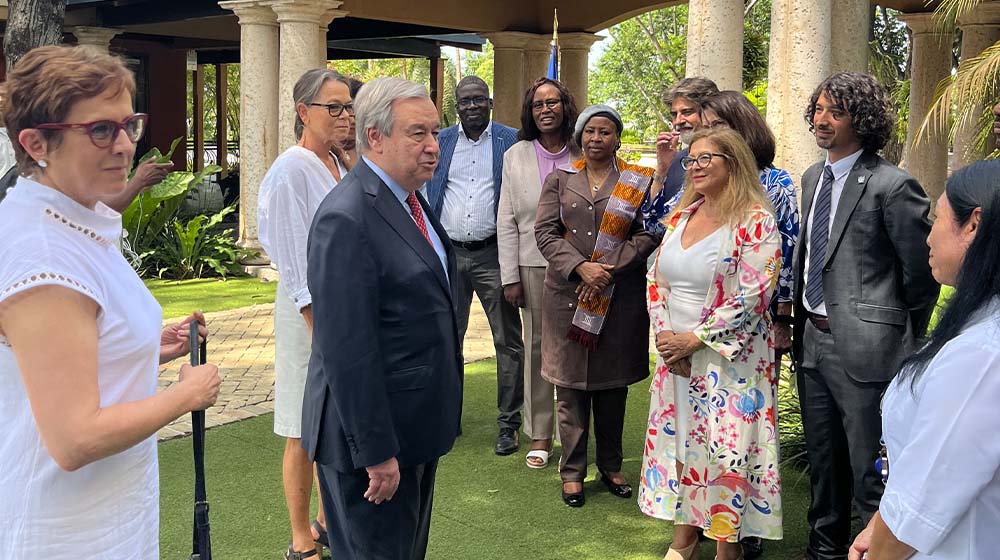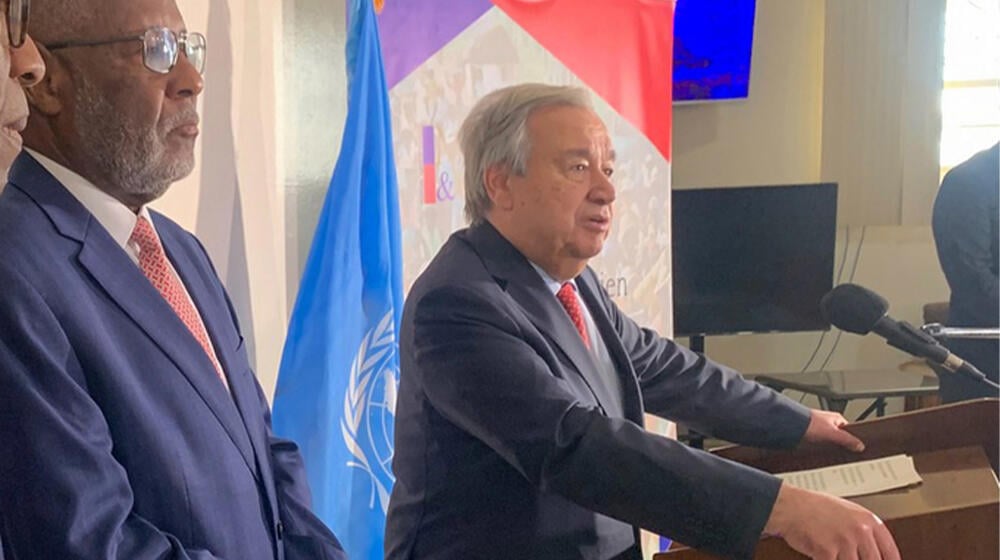UN Secretary-General António Guterres visited the Haitian capital Port-au-Prince on Saturday, calling for the immediate deployment of a robust international security force to assist the Haitian National Police in its fight against gangs.
"I've come with a simple message: the United Nations is with you. My solidarity is with the Haitian people, who are facing a terrible cycle of mutually exacerbating security, political and humanitarian crises," said the UN chief at a press conference in Port-au-Prince. He made the visit before attending a Caribbean Community (CARICOM) summit in Trinidad and Tobago.
He recalled that "brutal gang violence affects every aspect of public and private life in the country", with Port-au-Prince "encircled by armed gangs blocking the main roads leading to the northern and southern departments, controlling access to water and food, to health care".
Predatory gangs
He expressed his deep concern at the extreme vulnerability of populations to these "predatory gangs" - particularly the disproportionate impact of this violence on women and girls - and condemned in the strongest terms the widespread sexual violence used by armed gangs "as a weapon to instill fear".
According to the Secretary-General, the gravity of the situation demands "urgent and sustained attention, which places victims and civilian populations at the center of our concerns and priorities". "We need new, integrated approaches, combining security and political issues, the rule of law, humanitarian and development issues", he added. "There can be no lasting security without the re-establishment of democratic institutions - and it is impossible to achieve lasting and fully representative political solutions without a drastic improvement in the security situation".

"Every day counts. If we don't act now, instability and violence will have a lasting impact on generations of Haitians", insisted the UN chief, who reiterated his call for all partners to step up support for the national police - whether in terms of funding, training, or equipment.
Supporting the Haitian National Police
He thanked donors who had already made commitments to the joint program in support of the Haitian National Police.
"We need much more to restore state authority," he said, urging the Security Council to authorize "the immediate deployment of a robust international security force to assist the Haitian National Police in its fight against gangs".
"This is not the time to forget Haiti or to weaken our solidarity with its people", said Mr. Guterres, recalling that nearly two years have passed since the assassination of President Moïse. "The perpetrators of this heinous crime must be brought to justice. And Haiti must return to democratic order as soon as possible", he asserted.
During his visit, the Secretary General met with the Prime Minister, the High Transitional Council, civil society, and political parties, and discussed with them the need for a political agreement to end the crisis.
Now is not the time to forget Haiti
He called on all players "to create the conditions necessary for the re-establishment of democratic institutions". "Everyone must rise above their personal interests and make concessions in order to facilitate the emergence of a common vision and a viable, credible electoral path", he declared.
He welcomed the recent inter-Haitian talks, facilitated by the CARICOM Group of Eminent Persons, towards a consensus to form a government of national unity and expand the High Council of Transition.
In his view, "only an inclusive national dialogue - with the full participation of women and young people - will make it possible to put an end to insecurity and find lasting political solutions".
Growing humanitarian needs
On the humanitarian front, the Secretary-General noted that needs continue to grow, but that international support is falling short of expectations.
During his visit, Mr. Guterres also met Haitians and said he felt "the exhaustion of a population that has been facing a cascade of crises and unbearable living conditions for too long".
One person in two in Haiti lives in extreme poverty, faces hunger, and has no regular access to drinking water. The humanitarian response plan, which provides $720 million to help more than three million people, is only 23% funded.
The UN chief called on the international community to come to the aid of populations in need, saying it was a question of solidarity and moral justice.
He also praised "the courage and dedication of humanitarian workers, who often work in difficult conditions", and denounced attacks against them, which "must cease immediately". He also called on all stakeholders to ensure respect for human rights and international law, and to guarantee safe and unhindered humanitarian access.


